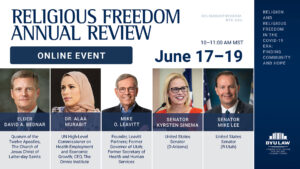
This post from Dr. Alaa Murabit is a transcript of her presentation delivered 17 June 2020, which opened the 2020 BYU Religious Freedom Annual Review. Dr. Murabit, a medical doctor from Canada, is UN High-Level Commissioner on Health Employment and Economic Growth
I am so honored to be speaking with you all today. And I wish I could have been there in person. Obviously, circumstances mean that we’re going to have this conversation virtually, but that doesn’t mean it has to be any less impactful. Now, for those of you who don’t know me very well, I’m Alaa Murabit, I’m a UN High Level Commissioner. I’m an SDG advocate. I’m a very new mom, which means I’m getting a lot less sleep than I would like. But, above and beyond everything else, I am a person of faith. I fundamentally view the world with a lens that accounts for mercy and love and compassion, and I view power in that lens as well. And so, when I was asked to come and speak about what religious freedom means, to me, I thought it was incredibly important for me to preface this with some context from my own life and my own upbringing, but also what I think we could potentially be doing better to ensure that religious freedom is, you know, is held for everyone. It’s not just for the select around the world. (more…)



